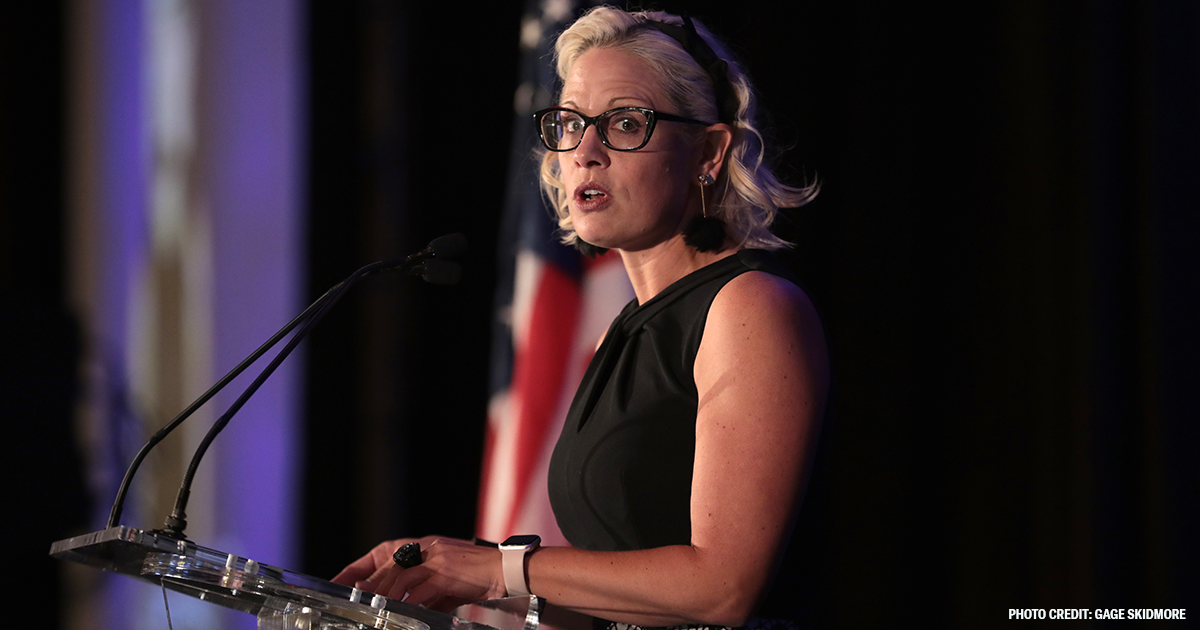By Donald Shaw, Sludge
Arizona Democratic Sen. Kyrsten Sinema’s fundraising from the private equity and hedge fund industries has been on a dramatic rise so far in the 2021-22 election cycle. Compared to the prior two years, she has roughly doubled her haul of campaign donations from the hedge fund industry and has raised more than two and a half times as much money from donors in the private equity industry, according to figures compiled by OpenSecrets.
Combined, the hedge fund and private equities industries have given Sinema $331,000 since January 2021, far more than the $133,042 that donors in those industries gave her the previous two years. The increase in donations is coming during a two-year cycle in which Sinema is not up for election, a period in senators’ six-year terms in which they typically see their fundraising flatline, and makes her the seventh-highest beneficiary of private equity industry donations in the Senate during that time. Sinema’s fundraising has increased across many industries this cycle, as she has become a key vote for the Democrats to pass legislation with the Senate evenly divided between the parties.
All those donations may be about to pay off for hedge fund and private equity executives. In exchange for her vote for the Inflation Reduction Act, Arizona Democratic Sen. Kyrsten Sinema demanded that the Democrats remove language from it that would have closed a tax loophole that lets wealthy hedge fund and private equity managers pay a lower income tax rate than many American workers.
It’s known as the carried interest loophole and it lets the partners of hedge funds and private equity companies treat the money they earn from their firms’ investments as capital gains, even when the original investment came from an endowment, a pension fund, or another wealthy investor, rather than from their own bank account. The loophole lets them claim the lower long-term capital gains rates of 15% or 20% that are provided by the tax code as an incentive for investors who actually have skin in the game, not for those managing other peoples’ investments. That’s lower than the marginal tax rate paid by single American workers for any income they earn above $40,525, of which they have to pay the federal government 22 percent.
The Senate passed the bill over the weekend—after Democratic leaders cut the carried interest language from it for Sinema—and the House is expected to vote on the Senate’s version of the bill on Friday.
Throughout Sinema’s congressional career, the private equity and hedge fund industries have donated $998,000 to her campaigns, according to OpenSecrets. That total includes large sums from the employees and PACs of firms like Crescent Capital Group ($213,000) and Blackstone ($71,000).
Sinema has also benefited from donations made by many of the wealthiest finance industry executives in the country.
Billionaire Marc Rowan, the co-founder of private equity firm Apollo Global Management who has a net worth of $4.4 billion, and his spouse Carolyn have donated $17,000 to Sinema’s campaign since 2018, according to FEC records. Rowan’s former partner at Apollo Leon Black, who is worth $8.4 billion, donated $5,400 to Sinema with his wife. Black stepped down from Apollo Global Management in 2021 after it was revealed that he had paid Jeffrey Epstein $158 million over the years for tax advice.
Hedge fund billionaire and former GOP megadonor Seth Klarman, the CEO of Baupost Group who is worth $1.5 billion, has donated $15,400 to Sinema’s campaign and leadership PAC. Other finance industry billionaires who have donated to Sinema include Bain Capital Chairman Joshua Bekenstein, who combined with his wife has donated $13,639, Renaissance Technologies non-executive chairman and advisor James Simons and his spouse Marilyn, who have given $10,800, and Stephen Mandel of the hedge fund Lone Pine Capital, who combined with his wife gave Sinema $5,400.
Private equity and hedge fund lobbyists have also shoveled money to Sinema’s campaigns. Since 2012, lobbyists who disclosed representing top industry trade associations—the American Investment Council, the Managed Funds Association, and the National Venture Capital Association—have donated $75,502 to Sinema’s campaigns. These lobbyists were all registered to represent at least one of these groups for at least one quarter from 2012 through the second quarter of this year.
While the finance industry has been buttering up Sinema for many years, it was last summer, as Democrats began crafting the reconciliation legislation that became the Inflation Reduction Act, that it began appealing directly to Sinema for her assistance on carried interest.
“Thank you for representing a top state for private investment,” states a June 2021 ad targeting Sinema from the American Investment Council, a private equity lobbying group representing companies like Bain Capital and Warburg Pincus. The ad asked Sinema to oppose “policies that discourage” private equity investment, a veiled reference to the carried interest tax loophole that Democratic leaders had already begun floating for elimination in the bill. Then in July 2021, American Investment Council president Drew Maloney published an op-ed in AZ Central calling the idea of eliminating the loophole a “penalty” on private equity and asking Sinema to support the industry. “I urge [Sinema and Arizona Sen. Mark Kelly] to continue supporting private investment’s role in helping small businesses here in Arizona and across the country,” Maloney wrote.
Beyond campaign donations, the hedge fund and private equity industries have found additional ways to send their money to coffers that benefit Sinema. Individuals employed in the industry have donated at least $95,900 to Sinema’s leadership PAC, which she calls ”Getting Stuff Done PAC,” a pot of money that the senator uses to finance travel, lodging, and other fundraising expenses, as well as for making donations to other politicians. Getting Stuff Done PAC donors have included Blackstone President Jonathan Gray, KKR Co-Founder George Roberts, Trian Fund Management Founding Partner Nelson Peltz, and many other prominent figures in the industries.
John LaBombard, Sinema’s former communications director, is now senior vice president at bipartisan public affairs firm ROKK Solutions. While ROKK does not publicly disclose its clients, they reportedly include financial services companies. This month, LaBombard has twice appeared on CNN to defend Sinema’s cuts to the provisions on carried interest, calling on Senate Democrats to agree with the changes.
A super PAC called Red and Gold PAC that spent nearly $1.7 million attacking Sinema’s Republican opponent in the 2018 elections, former Sen. Martha McSally, got nearly half of its overall funding from hedge fund billionaires. George Soros, founder of hedge fund Soros Fund Management, gave the super PAC $600,000 and James Simons gave it $500,000.



